Citizenship Act protests: Why fear has gripped Muslims in this Indian state
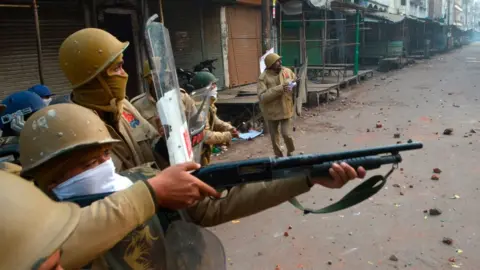 Getty Images
Getty ImagesNorthern India's Uttar Pradesh has been the worst affected in the ongoing protests against a controversial new citizenship law. At least 19 people have died in the state since protests began on 20 December. The BBC's Vikas Pandey travels to the region to find out why it has witnessed such large-scale and violent protests.
The extremely narrow lanes of Babupurwa in Kanpur city lead me to Mohammed Shareef's home.
He is sitting outside the small tin-roof house. It has just one room which doubles as a kitchen during the day and bedroom at night. He gets up, hugs me and breaks down. Several minutes pass in silence.
"I have lost everything. I have no will to live. What was my son's fault? Why did the police shoot him?" he says trying to hold back tears.
His 30-year-old son, Mohammed Raees, died on 23 December - three days after he was shot in the stomach.
"My son wasn't even protesting. He was a street hawker and just happened to be at the protest site. But even if he was protesting, did he deserve to die?
"Did he die because we are Muslims? Are we not citizens of this country? I will keep asking this question until I die," he says.
The protest where Mohammed Raees was shot was one of dozens which have taken place against the Citizenship Amendment Act (CAA) in Uttar Pradesh, one of the country's poorest states, and across India. Some have turned violent as stone-throwing protesters clashed with policemen.
At least 50 officers have been injured in the clashes in Uttar Pradesh alone - but the police have also been accused of using disproportionate force against anti-CAA protesters.
Civil rights groups say the law, which offers amnesty to non-Muslim immigrants from Pakistan, Bangladesh and Afghanistan, discriminates against Muslims. The government, however, argues it will protect religious minorities fleeing persecution, with Prime Minister Narendra Modi and Home Minister Amit Shah insisting it is not against Muslims.
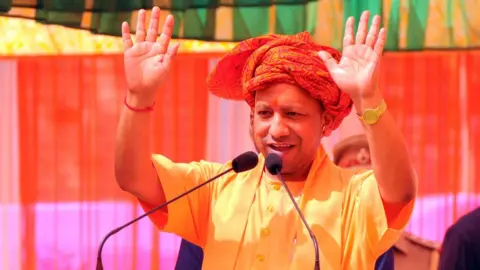 Getty Images
Getty ImagesBut protests, especially in Uttar Pradesh, home to more than 40 million Muslims, have continued.
The state's chief minister, Yogi Adityanath, has said that "revenge" will be taken against those who destroyed public property. "Their property will be confiscated to make up for the loss of public assets," he said.
The police have followed his orders and identified "wanted" people, mostly Muslims, and stuck their posters across Kanpur.
It has struck fear into the community. In Babupurwa, I met several women who said their sons, some as young as 10, and husbands have decided to flee to different cities because they fear arrest and torture.
That fear has been further compounded by the existence of the National Register of Citizens (NRC).
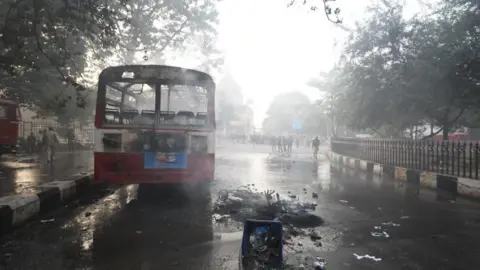 BBC
BBC"The NRC requires people to prove they are citizens of India," Nassiruddin, a politician and Muslim community leader in Kanpur, explains. "Just imagine if a Hindu family and a Muslim family both fail to prove citizenship - the former can use CAA to claim citizenship but the latter will be stripped of their citizenship."
The government says it has no plans to hold the NRC any time soon, but the community still fears they may not be able to produce the documents needed to prove their citizenship. Nassiruddin adds Muslims in the state are also scared because they don't trust the ruling Hindu nationalist Bharatiya Janata Party (BJP).
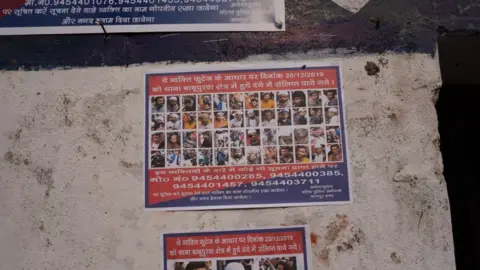 Anshul Verma
Anshul Verma"What is our fault? We are a democracy and we have every right to protest against something we don't agree with. But our protector has turned predator. Where should we go now?" says one woman, who did not want to be identified.
As I walked into different lanes, the scenes were similar - very few men and boys, but groups of women huddled together - almost as if they were waiting for somebody to ask them a question.
"Policemen came to our area in the night and told us that they would arrest all the men. They asked us to identify those who were protesting," another woman, who also did not want to be named, volunteers.
The fear in the Muslim community has been fuelled further by Yogi Adityanath's previous anti-Muslim statements, including advocating for a Donald Trump-style travel ban on Muslims in India, accusing Muslim men of forcibly converting Hindu women and comparing Bollywood star Shah Rukh Khan to Pakistan-based militant Hafiz Saeed.
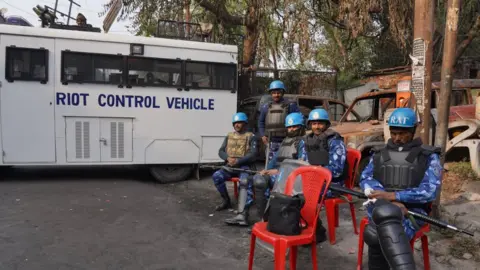 Anshul Verma
Anshul VermaMany believe that the chief minister is just following Mr Modi's idea of "muscular Hindu nationalism".
"Uttar Pradesh has become the ideology's main laboratory," Nassiruddin says.
Thousands, mostly Muslim men, have been detained across the state and internet services were suspended for days. Many prominent activists, including a former top policeman, have been detained.
The police have also been accused of intimidating Muslims. Video footage from Kanpur shows policemen allegedly vandalising cars and homes in Muslim-populated areas in the dead of the night. My colleagues reported claims of similar incidents from other parts of the state.
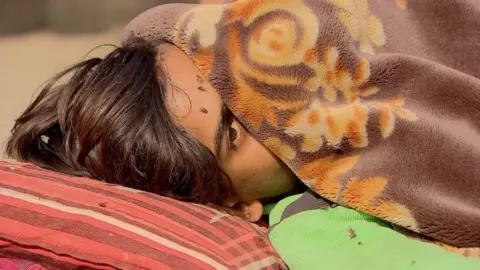 Varun Nayar
Varun NayarIndia correspondent Yogita Limaye was told the police had allegedly vandalised Muslims homes in several places in Muzaffarnagar, some 580km (360 miles) from Kanpur. In one house, they allegedly destroyed everything - including TVs, refrigerators and kitchen utensils.
"I also met men, and boys, who said they had been detained and beaten by the police," she reported.
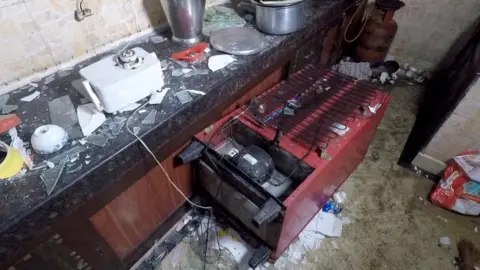 Varun Nayar
Varun NayarBBC Hindi's Zubair Ahmed also reported allegations of police brutality in Meerut and Bijnor, cities in western Uttar Pradesh.
At least eight people died of gunshot wounds in these areas. Their families said they were shot by the police - although police deny these allegations.
A pattern emerges when you hear these stories - detention, followed by vandalism of cars and ransacking of houses in Muslim-populated areas in the night.
But the state's top policeman responsible for law and order denied the allegations.
PV Ramasastry told the BBC that those responsible for damaging public property were being arrested and identified based on "digital evidence".
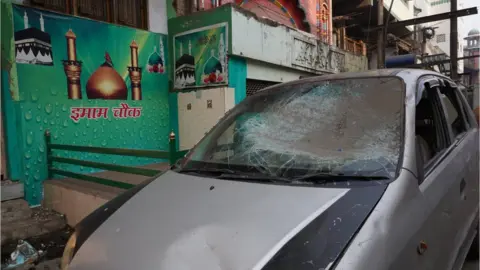 Anshul Verma
Anshul VermaWhen I asked him why the police have been quick to take action against protesters based on videos but not against its own officers, he said anybody was "free to make accusations".
He also denies that the police vandalised any property. When I showed him footage of the alleged incidents, Mr Ramasastry says "just a video randomly posted somewhere is not complete by itself".
"One has to freeze the location and the context. Any definitive answer cannot be offered based on a particular video," he adds.
He also denies police were involved in any of the state's 19 protest-related deaths, saying investigations were "ongoing".
But social activist Sumaiya Rana said the police need to be held accountable.
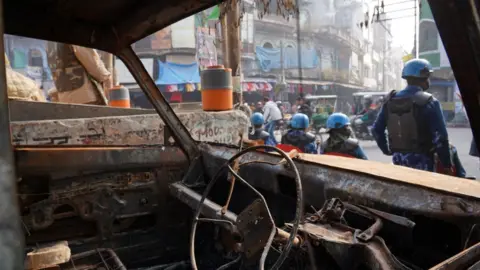 Anshul Verma
Anshul Verma"Violence is not the answer but that applies to both sides. Police should take action against those who indulged in violence, but is shooting at protesters the only way?" she said.
"So many people have died - we demand that a fair investigation should be held."
I spoke to policemen on the ground and some of them said they were working under intense pressure. One, who did not want to be identified, told me that they were ordered to "control protests at any cost".
"We had to baton charge and use tear-gas guns. It's not easy to use force against our own citizens. But you have to realise that policemen are just caught in the middle," he said.
Meanwhile, political parties have blamed each other for the protests.
The state's ruling BJP said protests turned violent because "young Muslim people were being misled by the opposition parties".
"We maintained law and order in the state well since we came to power three years ago. But this time, violence happened because of politics. The Samajwadi Party (SP) and the Bahujan Samaj Party have confused people about the CAA. They planned and instigated these protests," Swatantra Dev Singh, the BJP's state chief, told the BBC.
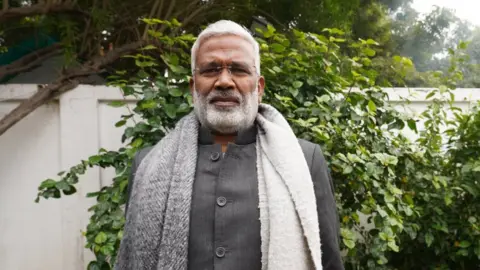 BBC
BBC"The CAA is not against Muslims or in fact against any other religion. Our government works for everybody - without discriminating against any caste or religion. We welcome criticism but nobody is allowed to damage public property," he said.
But those who died were mostly Muslims.
Mr Singh says any death is sad but the opposition parties are responsible for what has happened in the state.
Akhilesh Yadav, former chief minister and the leader of the Samajwadi Party, denied these allegations.
"The government needs to answer who shot these people? Why did the police not take any preventive measures?
"It's easy to make accusations. The protests show the BJP's failure in keeping peace in the state. They have brought the CAA to divert the attention from issues like the slowing economy and a lack of jobs. They want to divide the state on religious lines.
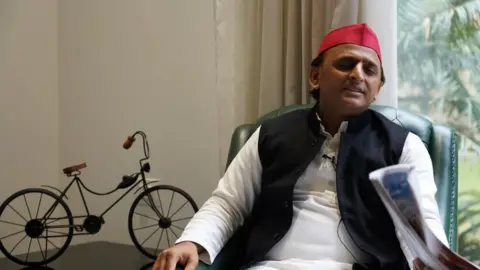 BBC
BBC"The chief minister and his Hindutva agenda is responsible for the situation. The way the police have behaved should ring alarm bells for everybody. It's not even about politics anymore - basic human rights are being violated and it's dangerous for the state and the country."
Civil society members say that all stakeholders are busy making accusations against each other but nobody is willing to give answers.
"The fact is that 19 people have died in one of India's largest state. Somebody has to answer to their families. We are a democracy and the cost of protest cannot be death," Ms Rana concludes.
All pictures subject to copyright
